
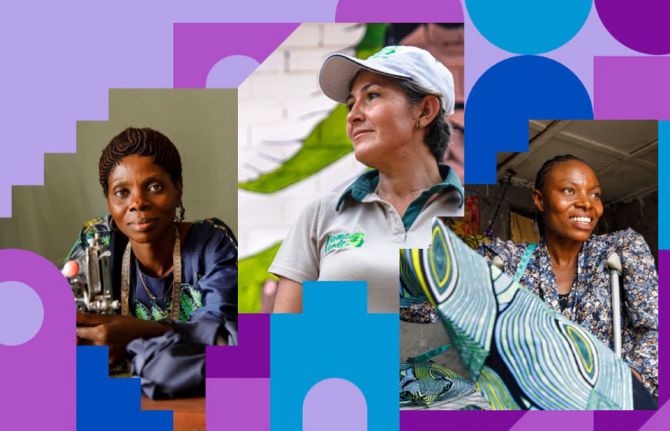
Press Statement
On International Women’s Day, UNAIDS calls for protecting women’s rights to protect their health
06 March 2024 06 March 2024GENEVA, 6 March 2024— Ahead of International Women’s Day, celebrated on 8 March, UNAIDS is calling for the protection of women’s rights to protect their health.
The world is way off track to meet the gender, equality and HIV targets that are part of the Sustainable Development Goals. At the current rate of progress, it will take an estimated 300 years to end child marriage, 140 years for women to be represented equally in positions of power and leadership in the workplace, and 47 years to achieve equal representation in national parliaments.
In addition, around the world at least five women or girls are killed every hour by someone in their own family. One in three women worldwide experience sexual or gender-based violence.
Women who experience violence are more at risk of acquiring HIV. This risk is heightened for the 600 million women and girls who live in the world’s conflict-affected countries, facing an increased danger of sexual violence. And in the majority of the world’s poorest countries, the debt crisis is squeezing out investment in education, health, and social protection, particularly hurting women and girls.
Women are further threatened by the organized pushback against women’s rights. “Today, women’s hard-won rights are under a globally coordinated, ruthless attack. Those facing the most vicious attack are already the most marginalized women,” said Winnie Byanyima, Executive Director of UNAIDS. “The injustices faced by women are not natural disasters to prepare for, like hurricanes or storms. They are man-made, and, as such, we can unmake them.”
The good news is that across the world, women and girls are leading struggles for equality and rights. Women are standing up against oppression in their homes, workplaces, and communities. Women’s movements are providing direct support to women and girls who face violence, and marching and striking for equality. To protect women’s rights, it is vital to support and resource these community organizations, civil society groups and women’s organizations—the frontline defenders of those rights.
Like justice, health is never given, it is won.
UNAIDS’ call this International Women’s Day, is to protect women and girls’ health, protect women and girls’ rights. In doing so, the world will end AIDS, and will overcome the inequalities driving it.
UNAIDS
The Joint United Nations Programme on HIV/AIDS (UNAIDS) leads and inspires the world to achieve its shared vision of zero new HIV infections, zero discrimination and zero AIDS-related deaths. UNAIDS unites the efforts of 11 UN organizations—UNHCR, UNICEF, WFP, UNDP, UNFPA, UNODC, UN Women, ILO, UNESCO, WHO and the World Bank—and works closely with global and national partners towards ending the AIDS epidemic by 2030 as part of the Sustainable Development Goals. Learn more at unaids.org and connect with us on Facebook, Twitter, Instagram and YouTube.
Watch Winnie Byanyima's message

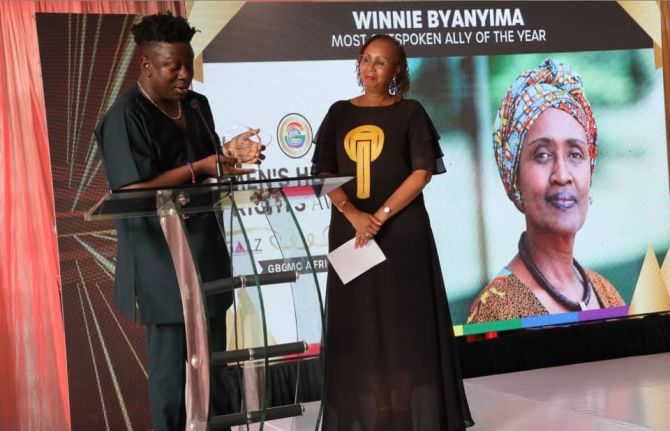
Press Release
Executive Director of UNAIDS awarded ‘Most outspoken Ally of the Year’ for her work supporting the rights of marginalized communities
08 December 2023 08 December 2023HARARE/GENEVA, 8 December 2023—The Executive Director of UNAIDS, Winnie Byanyima has been recognized as the ‘Most Outspoken Ally of the Year’ by Global Black Gay Men Connect for her extensive work advocating for the rights and well-being of marginalized communities. The announcement was made at the African Men Health and Rights award ceremony which took place today during the 22nd International Conference on AIDS and STIs.
“I am deeply honoured, and I accept this award on behalf of all the human rights and social justice warriors tackling inequalities around the world today,” said Ms Byanyima. “I will continue to be your outspoken ally, promoting inclusivity, fighting stigma and discrimination, and championing equal access to healthcare and human rights for all.”
“Your tireless advocacy for the rights and well-being of marginalized communities, including the LGBTQ+ community, has not gone unnoticed, said Michael Ighodaro, Co-founder, Global Black Gay Men Connect. “Your dedication is truly commendable. Your voice has been an unwavering source of support and inspiration for countless individuals and organizations across the globe.
Gay men and other men who have sex with men continue to be stigmatized and marginalized, keeping them away from health and social services and rendering them more at risk of becoming infected with HIV and less likely to seek treatment. In 2022, HIV prevalence amongst gay men and other men who have sex with men was almost 13% in Eastern and Southern Africa and 8% in West and Central Africa.
Today 67 countries still criminalize same sex relations. Evidence shows that criminalizing LGBTQI people for who they are and who they love prevents them from accessing HIV services. Even when they can access those services, they cannot do so with dignity due to the stigma and discrimination they face, which further exacerbates their vulnerability.
Countries that do not criminalize LGBTQI people are more likely to reach marginalized communities most affected by HIV. In recent years many African countries have moved away from the archaic laws that criminalize same sex sexual relations. Since 2016, Angola, Botswana, Gabon, Mauritius, and Seychelles have repealed laws criminalizing LGBTQI people. Progress has been uneven however, and alarming backsliding on punitive laws has been seen in a number of countries.
“Movements like Global Black Gay Men Connect is on the frontlines of the HIV response around the world. We must safeguard their leadership role to end AIDS and create a more just and equitable world.” said Ms Byanyima.
GLOBAL BLACK GAY MEN CONNECT
Global Black Gay Men Connect is an international, social justice platform that brings together black gay men from around the world to foster resilience against oppression and to advocate for the human rights and wellbeing of marginalized communities, including human rights centered HIV prevention and treatment services.
UNAIDS
The Joint United Nations Programme on HIV/AIDS (UNAIDS) leads and inspires the world to achieve its shared vision of zero new HIV infections, zero discrimination and zero AIDS-related deaths. UNAIDS unites the efforts of 11 UN organizations—UNHCR, UNICEF, WFP, UNDP, UNFPA, UNODC, UN Women, ILO, UNESCO, WHO and the World Bank—and works closely with global and national partners towards ending the AIDS epidemic by 2030 as part of the Sustainable Development Goals. Learn more at unaids.org and connect with us on Facebook, Twitter, Instagram and YouTube.

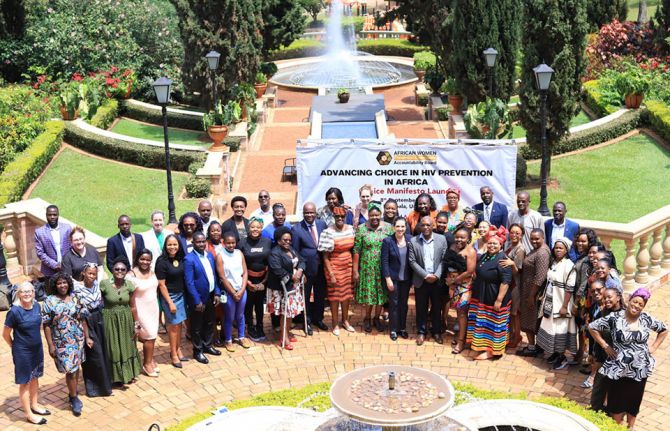
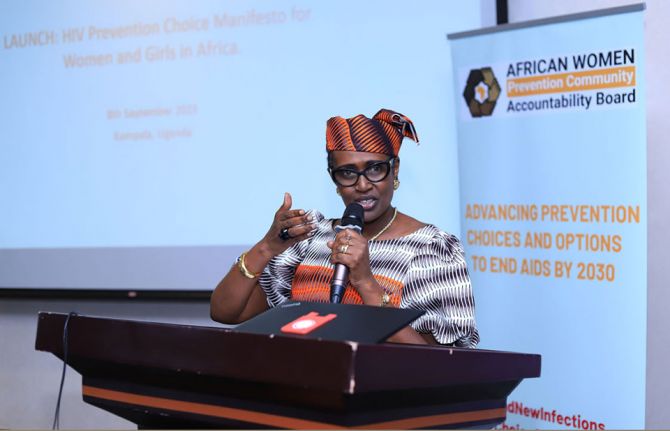
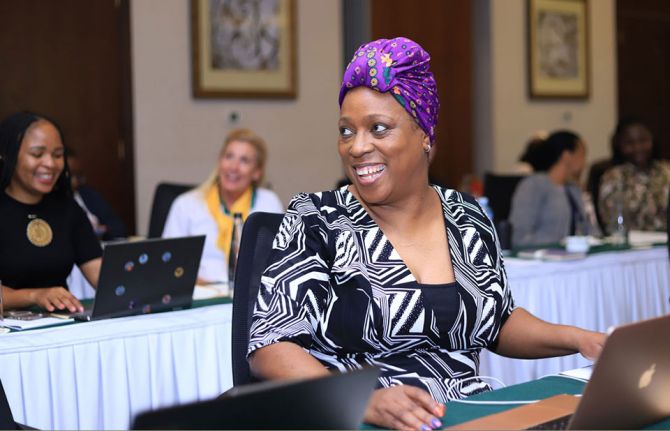
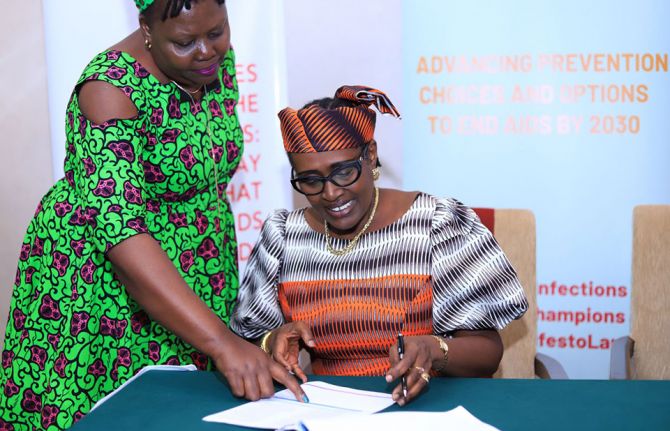
Feature Story
HIV Prevention Choice Manifesto for Women and Girls in Africa launched
12 September 2023
12 September 2023 12 September 2023UNAIDS Executive Director, Winnie Byanyima, joined women’s coalitions, government officials, development partners and community groups from across East and Southern Africa to launch the HIV Prevention Choice Manifesto. Led by the African Women Prevention Community Accountability Board and supported by the International Community of Women Living with HIV (ICW) East Africa and Advocacy for Prevention of HIV and AIDS (APHA), the Choice Manifesto advocates for choice in the HIV prevention options available for women and a commitment to expanding access to long-acting HIV health technologies. Further, these options should be people centred, women-centred and women-led.
In her keynote remarks Ms Byanyima focused on three key areas to making women-centred, people-centred prevention approaches work:
- tackling inequalities for girls and women;
- addressing unequal access to health technologies;
- and putting communities & women in the lead.
Ms Byanyima signed the Choice Manifesto on behalf of UNAIDS and committed to supporting and amplifying the voices of African women and confirmed that UNAIDS will continue to convene partners and government to find solutions.
Quotes
I congratulate you for the HIV Prevention Choice Manifesto. It’s about pushing everyone towards people-centred, women-centred and women-led approaches to HIV prevention. You have fought with your lives to get here. You are fearless feminists. Women must lead for themselves.
We must trust women, let women lead, let African women lead! The AWPCAB board is 12 women from 6 countries from Eastern and Southern Africa. Our focus is on the choice agenda, access and roll out to make sure choice is a reality for all women!
The Choice Manifesto is an important moment in the HIV response and should take its rightful place next to the Denver Declaration and GIPA principles as a watershed moment. Developed and driven by African women for African women and relevant for all women.
Our work

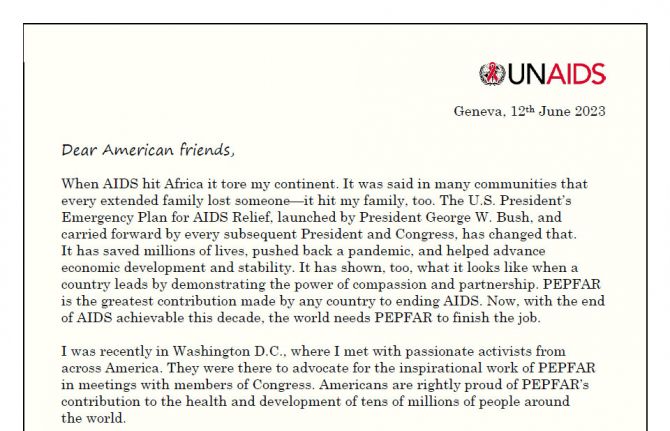
Feature Story
A Thank You letter to the American people from the Executive Director of UNAIDS: PEPFAR is the Greatest Contribution Made by Any Country to Ending AIDS
12 June 2023
12 June 2023 12 June 2023To mark the 20th Anniversary year of PEPFAR, UNAIDS Executive Director has written a letter to the American people.
You can read the text of her letter below. Click here to be able to view the actual letter.
Dear American friends,
When AIDS hit Africa it tore my continent. It was said in many communities that every extended family lost someone—it hit my family, too. The U.S. President’s Emergency Plan for AIDS Relief, launched by President George W. Bush, and carried forward by every subsequent President and Congress, has changed that. It has saved millions of lives, pushed back a pandemic, and helped advance economic development and stability. It has shown, too, what it looks like when a country leads by demonstrating the power of compassion and partnership. PEPFAR is the greatest contribution made by any country to ending AIDS. Now, with the end of AIDS achievable this decade, the world needs PEPFAR to finish the job.
I was recently in Washington D.C., where I met with passionate activists from across America. They were there to advocate for the inspirational work of PEPFAR in meetings with members of Congress. Americans are rightly proud of PEPFAR’s contribution to the health and development of tens of millions of people around the world.
In the last 20 years, the U.S. Government has invested more than US$110 billion to support the response to HIV and AIDS in 55 low and middle-income countries with the highest burden of HIV. The results that PEPFAR has helped make possible are remarkable—the rate of new HIV infections has fallen by almost half, AIDS-related deaths have been reduced by two thirds, and three-quarters of people living with HIV are on life-saving medicine. Millions of deaths have been prevented, and millions of babies have been born HIV-free.
Through the global HIV response, PEPFAR’s work has strengthened health and community systems, delivering broader outcomes for health, economic and human development and equity, accelerating progress towards achievement across the Sustainable Development Goals. Annually, PEPFAR has provided support and services through more than 70 000 facility and community health clinics; 3000 laboratories and nearly 30 national reference laboratories, as well as more than 340 000 health care and community workers. PEPFAR’s investment in health systems contributes significantly to national surveillance and health information capacities, which were critical to national COVID-19 responses and remain crucial for managing future pandemics and other public health threats.
PEPFAR has demonstrated the invaluable role of community engagement and civil society for advancing health and sustainable development, from helping faith-based organizations providing essential HIV care and support services across Africa, to ensuring support for Ukrainian civil society as the front-line of the national HIV response throughout the war.
As an important part of U.S. diplomacy, PEPFAR’s unflinching commitment to stand up against discrimination and inequities in HIV services sends a powerful signal that the world needs to ensure that nobody is left behind if we are to end AIDS.
PEPFAR works through partnerships. I look forward to my upcoming joint mission in Africa with PEPFAR and the Global Fund. At UNAIDS, which works on the ground in over 90 countries, including all 55 PEPFAR partner countries, we see the difference PEPFAR makes every day.
Twenty years ago, President Bush launched the creation of PEPFAR by announcing that “seldom has history offered a greater opportunity to do so much for so many”. In 2003, U.S. Congress moved swiftly to authorize PEPFAR within weeks. PEPFAR legislation was reauthorized in 2008, 2013 and 2018, with the bipartisan leadership and support of the U.S. Congress. With the lives of tens of millions of people hanging in the balance, countries, communities and UNAIDS are confident that we can rely on the American people, and that the U.S. Government and the U.S. Congress will continue to demonstrate unparalleled leadership through support for PEPFAR.
What was once a dream, but which PEPFAR’s partnership makes possible—the end of AIDS by 2030—is a reflection of the values of the American people. So today I wanted to write to you to say Thank You.
Yours,
Winnie Byanyima
UNAIDS Executive Director
Under-Secretary-General of the United Nations
Partners
Related

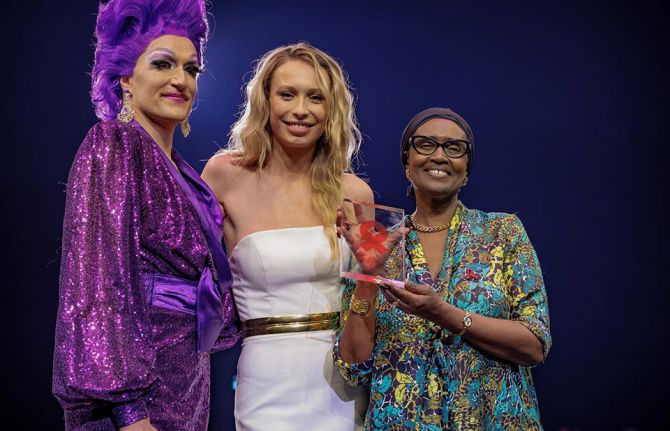

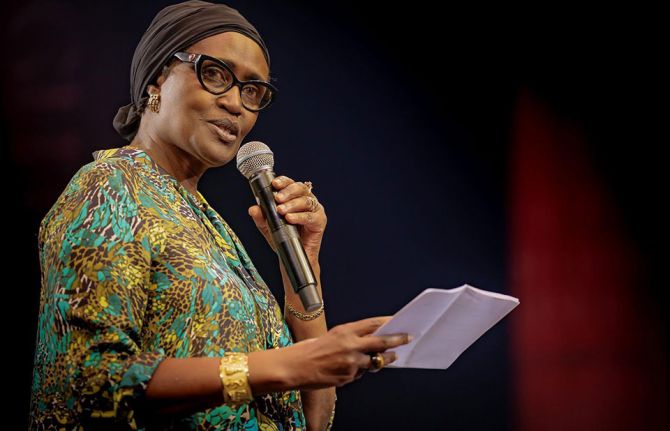
Press Release
Executive Director of UNAIDS receives prestigious award for activism
13 June 2023 13 June 2023GENEVA, 13 June 2023—The Executive Director of UNAIDS Winnie Byanyima has been presented with the prestigious Amsterdam Dinner Award 2023 for her activism and work to end stigma and discrimination around HIV. The annual Amsterdam Dinner, initiated in 1992, is the Netherlands largest fundraising event for HIV and has raised millions of euros to support HIV projects around the world.
Delivering remarks on behalf of Liesje Schreinemacher, Minister for Foreign Trade and Development Cooperation, Loiza Lamers said, “The situation in Uganda makes clear once again that the struggle for equal rights is far from over and proof that the world needs more people like her and more than ever. I am proud that the Netherlands is her ally in this fight. Being who you are and loving who you love should never be a crime.”
“We are grateful that the Netherlands stands strong on LGBTIQ rights and the rights of women and girls and that you are our steadfast ally in this fight,” said Ms Byanyima.
This year’s event shone a spotlight on work for women by women and highlighted the disproportionate impact HIV is having on women and girls. Around the world a young woman aged between 15 and 24 becomes infected with HIV every two minutes and in sub-Saharan Africa young women and girls are 3 times more likely to become infected with HIV than their male peers.
Ms Byanyima is a fierce advocate for the rights of women and girls as well as for the rights of key populations most affected by HIV. “I share this honour with thousands of passionate, fearless activists around the world who daily fight stigma and discrimination and defend the right to health of every human being. I share it with my UNAIDS colleagues,” said Ms Byanyima.
The event held on 10 June in Amsterdam raised 1.3 million euros for projects for women living with HIV in Mozambique and the Netherlands.
UNAIDS
The Joint United Nations Programme on HIV/AIDS (UNAIDS) leads and inspires the world to achieve its shared vision of zero new HIV infections, zero discrimination and zero AIDS-related deaths. UNAIDS unites the efforts of 11 UN organizations—UNHCR, UNICEF, WFP, UNDP, UNFPA, UNODC, UN Women, ILO, UNESCO, WHO and the World Bank—and works closely with global and national partners towards ending the AIDS epidemic by 2030 as part of the Sustainable Development Goals. Learn more at unaids.org and connect with us on Facebook, Twitter, Instagram and YouTube.
Region/country

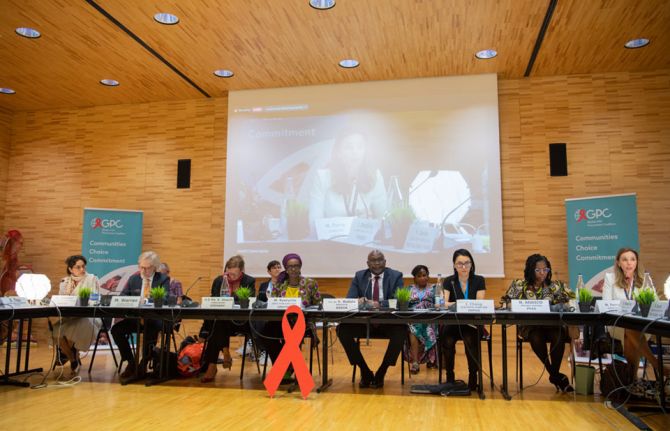
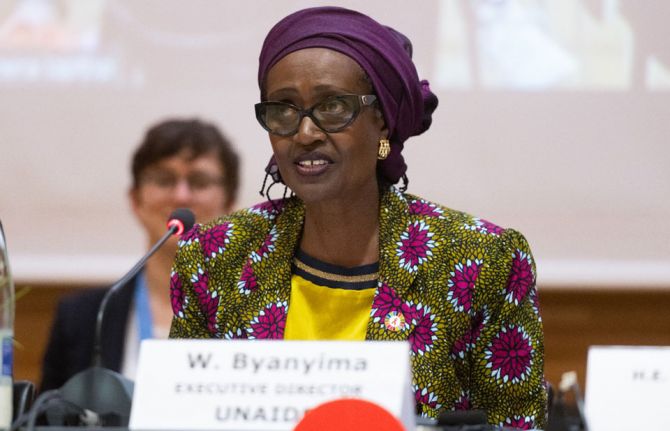
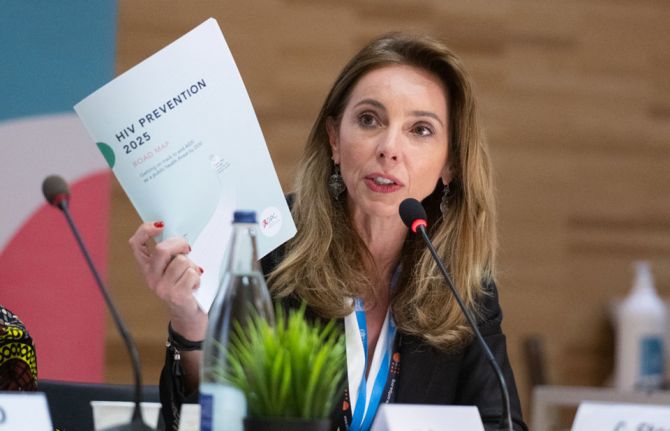
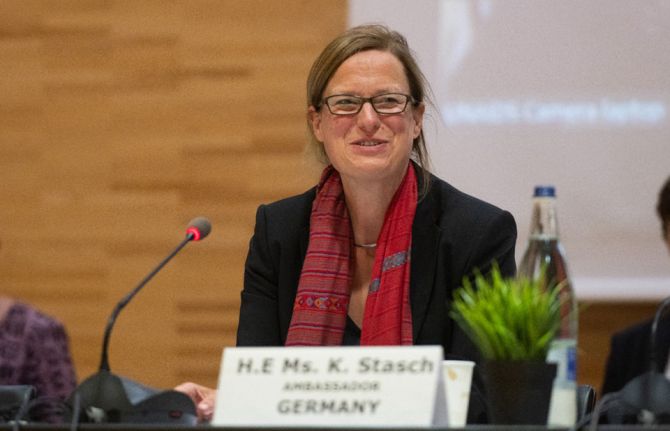
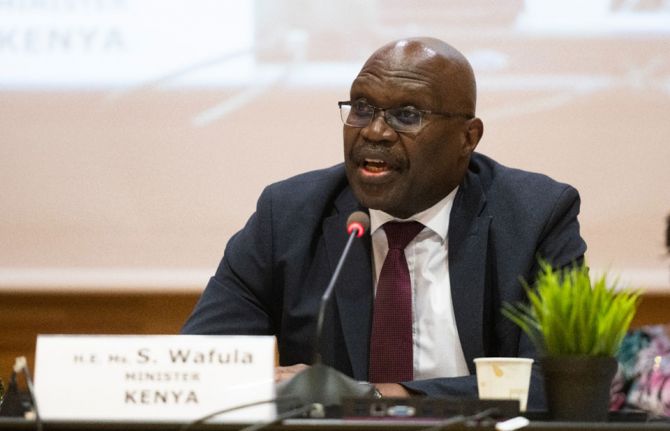
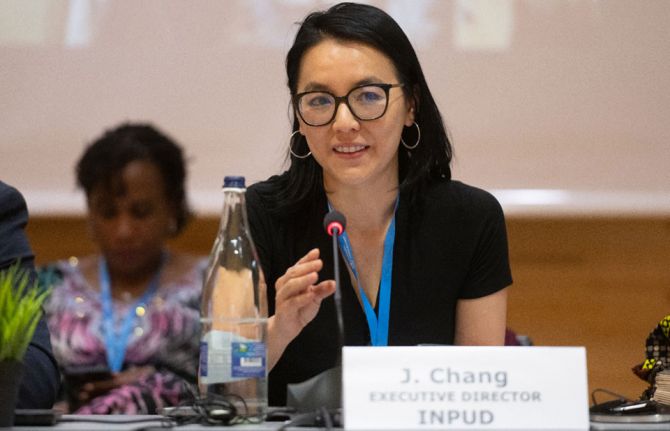
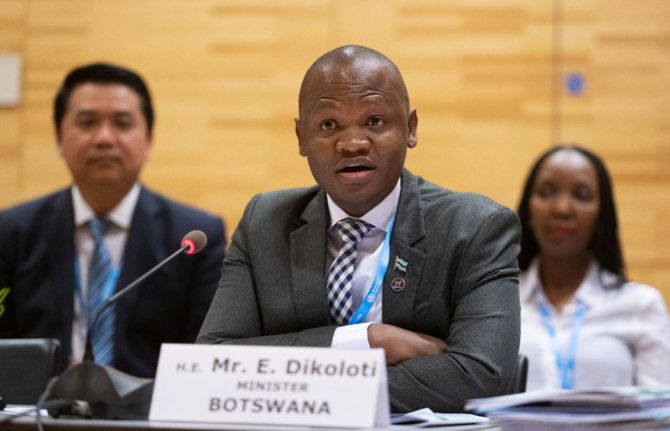
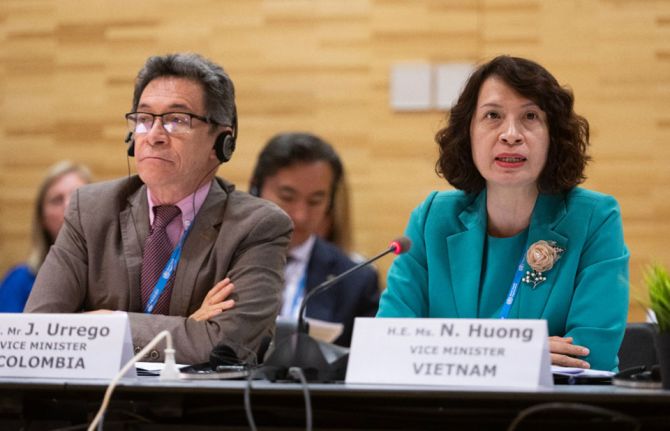
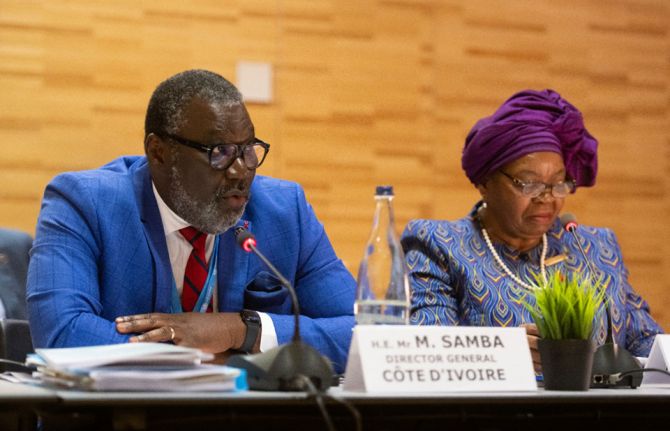
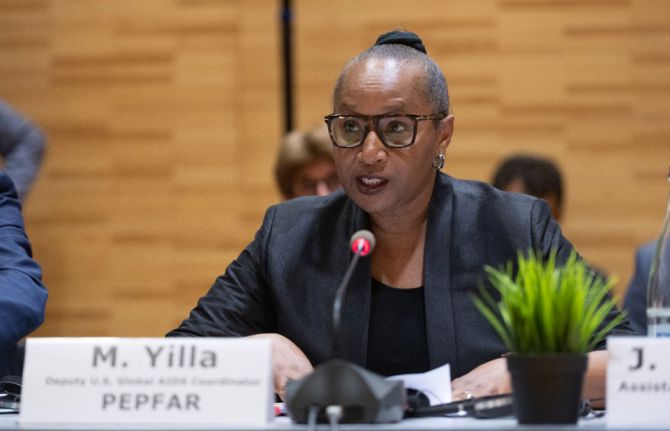
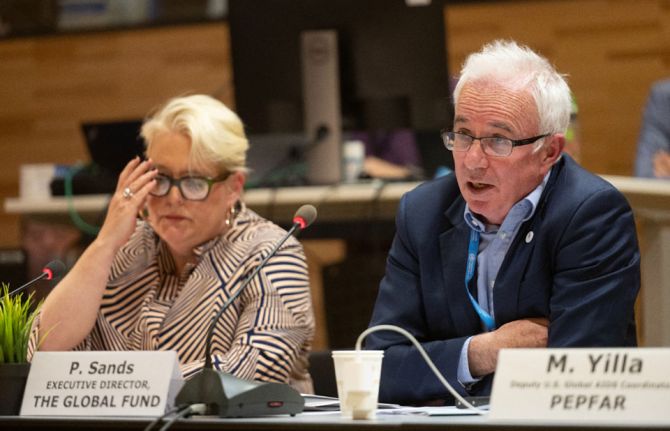
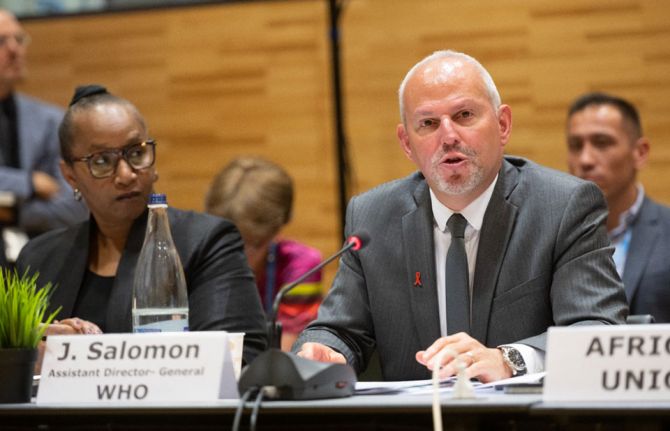
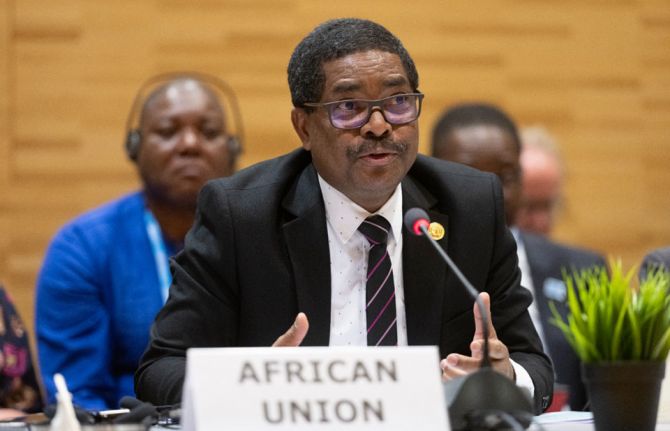
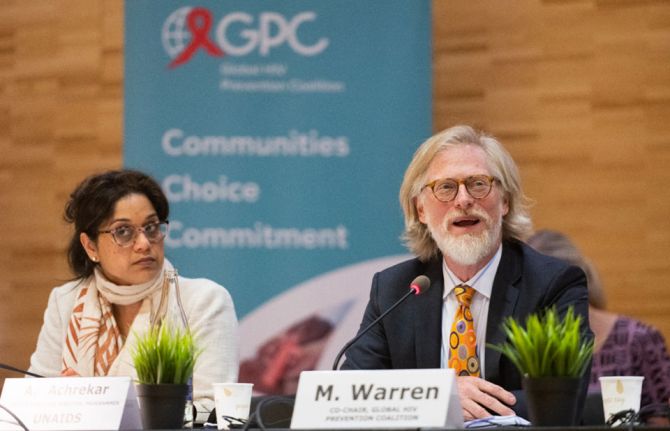
Press Release
UNAIDS alerts countries to an unprecedented opportunity to stop new HIV infections, end AIDS and prepare for future pandemics
24 May 2023 24 May 2023GENEVA, 24 May 2023—UNAIDS urges countries to take full advantage of new opportunities to step up funding, expand new and proven HIV prevention technologies and remove barriers to HIV services. Taking action today will boost progress to end AIDS and respond to current pandemics and pandemics of the future.
On the side-lines of the 76th World Health Assembly, Ministers of Health joined global health leaders and experts at a high-level event of the Global HIV Prevention Coalition. Hosted by UNAIDS, the event was called to increase political commitment, address policies and laws that drive inequalities and pandemics, secure additional funding and ensure effective HIV programming is implemented at scale.
“Never has the opportunity to prevent HIV been greater,” said Winnie Byanyima, Executive Director of UNAIDS. “We have tools and technologies—none of which are being made available widely enough. Doing justice to this unique opportunity requires bold leadership and renewed investment into HIV prevention to provide effective prevention choices to all who need them.”
UNAIDS In Danger report showed that in 2021 there were 1.5 million new HIV infections globally, more than three times the target of 500 000 at the end of 2021. The 2025 target is to reduce new HIV infections to less than 370 000. In order to reach that target, countries will need to attain an 82.5% reduction from 2010 as outlined in the 2025 HIV Prevention Roadmap - a 10 step how-to- guide to reach the 2025 targets.
“This is the best chance we’ve ever had, in probably the entire history of the AIDS pandemic, to reimagine HIV prevention and to do it with equity and with impact,” said Mitchell Warren, Global HIV Prevention Coalition, Co-chair.
Of the 28 priority countries identified by the Global HIV Prevention Coalition, new analysis of data from UNAIDS, shows that five countries (Cote d’Ivoire, Zimbabwe, Malawi, Lesotho and the Islamic Republic of Iran) reduced new HIV infections by more than 61% from 2010 to 2021—the level of progress needed. A further twelve countries recorded a reduction of more than 40%.
Data also show however, that new HIV infections are rising in 38 countries, some with sizeable HIV epidemics. This worrying trend calls for accelerating prevention and expanding the Coalition to these countries.
According to the 2022 UNAIDS Global HIV Prevention Coalition country scorecards, dedicated HIV prevention programmes for adolescent girls and young women only exist in 41% of districts with moderate to high HIV incidence in sub-Saharan Africa.
The scorecards also show that in Coalition focus countries with available data, 63% of sex workers, 49% of gay men and other men who have sex with men and 36% of people who inject drugs were reached with HIV prevention services in 2021. High stigma in mainstream health service delivery, criminalization of key populations, harmful law enforcement practices, gender and structural barriers remain major obstacles to access HIV prevention services for key populations.
“Evidence and rights-based HIV programming, that meaningfully involves key populations, is simply not being sufficiently invested in and brought to scale. For example, when it comes to people who use drugs, only 2% of us live in countries with high coverage of basic harm reduction services,” said Judy Chang, International Network of People who Use Drugs. “If we fail to make investments based on public health rationale, but do so based on so-called moral agendas, we will fail global health. We need countries to invest fully in HIV prevention and community systems.”
Access to condoms, PrEP (medicine to prevent HIV) and voluntary medical male circumcision remains highly uneven. Only Uganda and Zimbabwe met more than 80% of the condom distribution need. Data also suggests declining condom use in several countries after 2015 showing an urgent need to halt and reverse declining trends in condom use. Although uptake of PrEP increased rapidly in the 28 focus countries, absolute numbers remain very low—1.5 million users at the end of 2021 against the global target of more than 10 million.
The number of men undergoing voluntary medical male circumcision for HIV prevention (which studies show prevents HIV by up to 60% for men) was consistently more than 4 million per year from 2017-19, declined by 40% in 2020 and in 2021 remained at 2.8 million with only Ethiopia, Tanzania and Zambia meeting annual targets. These programmes require renewed focus in countries to meet 90% targets set out in the Global AIDS Strategy 2021-2026.
This data analysis highlights both encouraging successes and persistent gaps in national HIV prevention programmes. The reality of success in several countries paired with new available technologies creates a unique opportunity for concerted action to stop new HIV infections, end AIDS and strengthen pandemic preparedness and response.
UNAIDS
The Joint United Nations Programme on HIV/AIDS (UNAIDS) leads and inspires the world to achieve its shared vision of zero new HIV infections, zero discrimination and zero AIDS-related deaths. UNAIDS unites the efforts of 11 UN organizations—UNHCR, UNICEF, WFP, UNDP, UNFPA, UNODC, UN Women, ILO, UNESCO, WHO and the World Bank—and works closely with global and national partners towards ending the AIDS epidemic by 2030 as part of the Sustainable Development Goals. Learn more at unaids.org and connect with us on Facebook, Twitter, Instagram and YouTube.

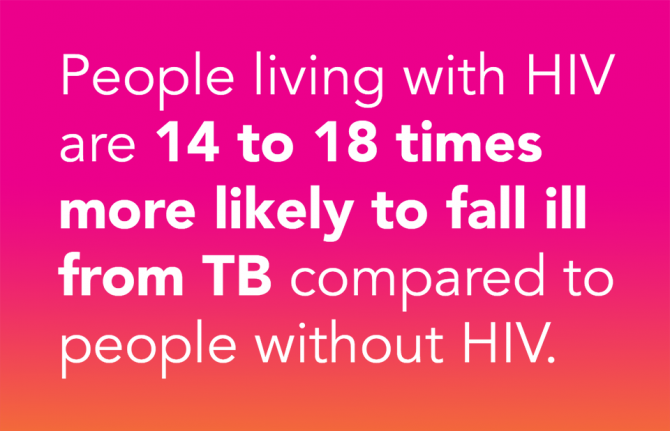
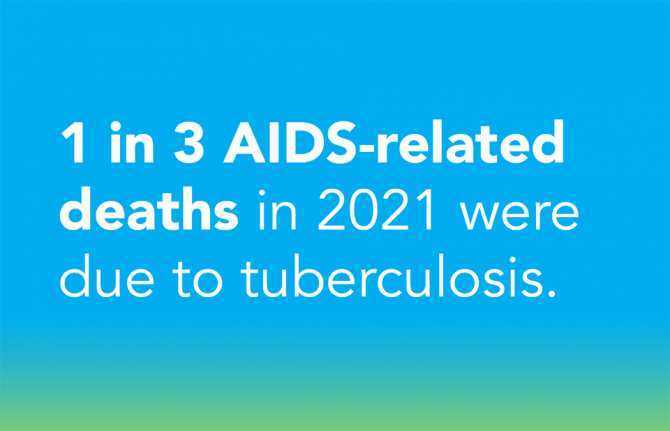
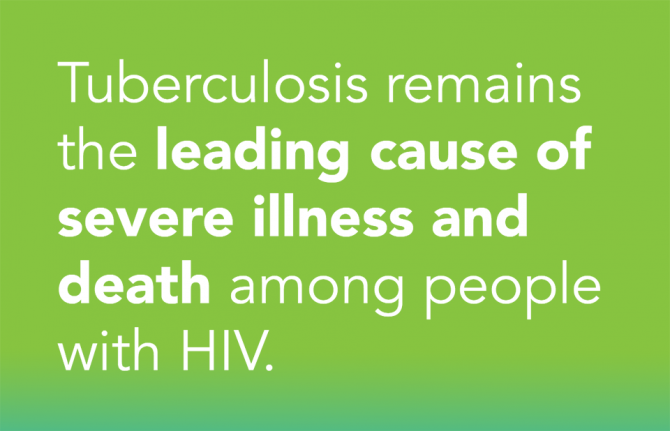
Press Statement
UNAIDS Executive Director Message on World TB Day – Yes, we shall and we can end TB among people living with HIV!
24 March 2023 24 March 2023Today, on World TB Day, we must recognize the urgent need to end the TB epidemic around the world, especially among people living with HIV.
TB remains a leading cause of severe illness and death among people with HIV. According to the World Health Organization Global TB Report 2022, people with HIV are 14-18 times more likely to fall ill from TB compared to people without HIV. About one in three AIDS related deaths were in 2021 were due to TB. We cannot allow this to continue. We must ensure that all people living with HIV and those vulnerable to TB have access to TB prevention, diagnosis, and treatment services.
We continue to miss opportunities to deploy the tools we have against HIV / TB co-infection. Almost half of people living with HIV who developed TB in 2021 were not diagnosed or reported to have TB and coverage of TB preventive therapy among eligible HIV positive persons remains at only 42%.
Like in the responses to HIV and COVID 19, inequalities are the root cause making some people at higher risk of TB, due to social economic, geographic, gender factors and humanitarian and crisis situations. Legal and policy environments also affect access to health services for those who need them the most. We shall not forget that for any health programs to work, we need to put people at the center and engage beneficiaries, particularly the less served communities, to be part and parcel of the planning, implementation and monitoring the response.
Today on World TB Day, I would like to call on all our partners to redouble efforts to ensure early identification, treatment, and prevention of TB in people living with HIV by scaling up the recommended screening and diagnostic tools, providing integrated quality treatment and care, rolling out short-course TB preventive treatments, and removing barriers that affect the smooth implementation of programs.
By ending TB among people living with HIV, we will save more lives, reduce suffering, and move closer to ending both epidemics for good.
UNAIDS
The Joint United Nations Programme on HIV/AIDS (UNAIDS) leads and inspires the world to achieve its shared vision of zero new HIV infections, zero discrimination and zero AIDS-related deaths. UNAIDS unites the efforts of 11 UN organizations—UNHCR, UNICEF, WFP, UNDP, UNFPA, UNODC, UN Women, ILO, UNESCO, WHO and the World Bank—and works closely with global and national partners towards ending the AIDS epidemic by 2030 as part of the Sustainable Development Goals. Learn more at unaids.org and connect with us on Facebook, Twitter, Instagram and YouTube.
Our work

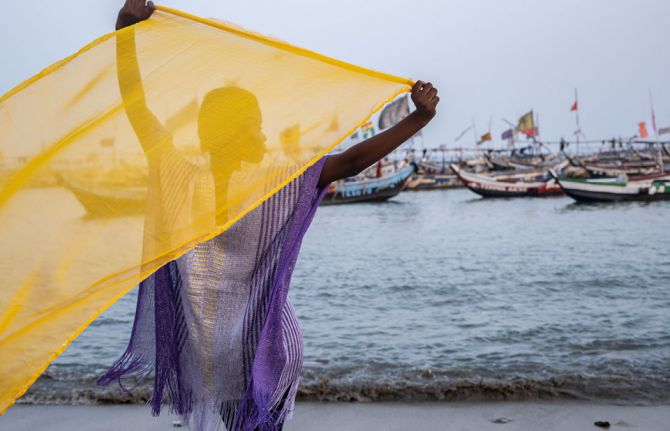
Press Statement
On Zero Discrimination Day, countries urged to decriminalise to save lives
28 February 2023 28 February 2023On Zero Discrimination Day 2023, commemorated on March 1, UNAIDS highlights the need to remove laws that criminalize people living with HIV and key populations.* The 2023 theme, “Save lives: Decriminalize”, points to the positive impact on health and life outcomes when discriminatory and punitive laws are removed.
In 2021, the world set ambitious law reform targets to remove criminal laws that are undermining the HIV response and leaving key populations behind. Recognizing decriminalization as a critical element in the response, countries made a commitment that by 2025 less than 10% of countries would have punitive legal and policy environments that affect the HIV response.
Winnie Byanyima, Executive Director of UNAIDS, said:
"Criminalizing laws chase people away from life-saving treatment. Those need to be removed. The only reason people are still dying of AIDS is the inequalities in society, from social norms, from the lack of opportunities in school, etc. and all these come together to make them more at risk."
"At the country level, repealing criminal laws that are driving people away from HIV prevention and treatment is critical.”
These targets are ambitious but they are necessary
Research in sub-Saharan Africa has shown that the prevalence of HIV among gay men and other men who have sex with men was five times higher in countries that criminalize same-sex sexual activity compared to those that do not, and 12 times higher where there were recent prosecutions.
Criminalization of sex work increases both the risk of sex workers acquiring HIV and their vulnerability to violence perpetrated by clients, police and other third parties. The criminalization of the clients of sex workers has also been repeatedly shown to negatively affect sex workers’ safety and health, including reducing condom access and use, and increasing the rates of violence.
Decriminalization of drug use and possession for personal use is associated with significant decreases in HIV incidence among people who inject drugs, including through greater access to harm reduction services, reductions in violence and arrest or harassment by law enforcement agencies.
Winnie Byanyima said:
"We have the evidence that when you repeal criminal laws on same-sex relations that the risk of contracting HIV falls, the risk of new infections amongst gay men, MSM, drops significantly.
"To me HIV is a disease but it's more a social injustice. It's driven by inequalities in society. These are not things that can happen without a consensus in the society, so we need everybody on board."
Law reform is therefore critical if we are to end AIDS as a public health threat by 2030.
The targets are ambitious but not impossible
Indeed, recent experience is proving just how possible they are. In 2022 alone Belgium and Australia have removed laws criminalizing sex work; Zimbabwe decriminalized HIV exposure, non-disclosure, and transmission and the Central Africa Republic reduced the scope of its HIV criminal laws; Antigua & Barbuda, St Kitts & Nevis, Singapore and Barbados have repealed old colonial laws criminalizing same-sex sexual activity. Kuwait repealed a law criminalizing the imitation of the opposite sex, a law used to target transgender persons while New Zealand removed travel restrictions relating to HIV.
However, despite such encouraging reforms, the world is not on track to ensure that less than 10% of countries have punitive legal and policy environments that create barriers to accessing HIV services. In 2021, 134 reporting countries explicitly criminalized or otherwise prosecuted HIV exposure, non-disclosure or transmission; 20 reporting countries criminalized and/or prosecuted transgender persons; 153 reporting countries criminalized at least one aspect of sex work; and 67 countries now criminalize consensual same-sex sexual activity, according to UNAIDS. In addition, 48 countries still place restrictions on entry into their territory for people living with HIV, while 53 countries report that they require mandatory HIV testing, for example for marriage certificates or for performing certain professions. 106 countries report requiring parental consent for adolescents to access HIV testing.
Such laws and sanctions violate international human rights norms and stigmatize and discriminate against already marginalized populations.
Decriminalisation saves lives and helps advance the end of the AIDS pandemic.
* Key populations are communities at higher risk of HIV infection including gay men and other men who have sex with men, people who use drugs, sex workers, transgender people and people in prisons and other closed settings.

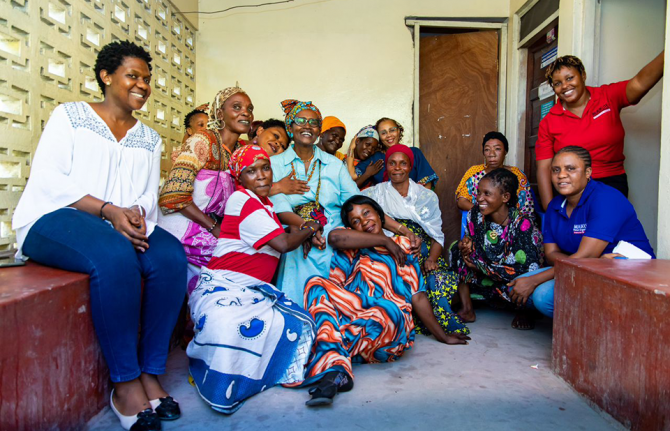
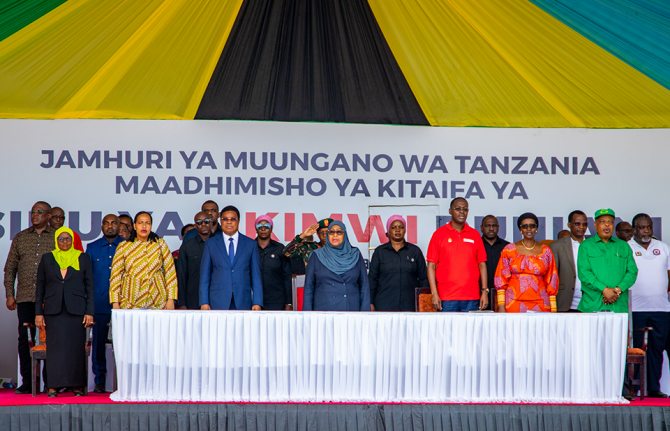

Feature Story
By bringing an end to societal and economic inequalities, we can end AIDS in Tanzania
05 December 2022
05 December 2022 05 December 2022Following a one-week visit to Tanzania and Zanzibar to launch the 2022 Global World AIDS Day report; to commemorate World AIDS Day; and to see first-hand the extraordinary work of joint efforts by the government, partners and communities to end AIDS in Tanzania and Zanzibar, UNAIDS Executive Director Winnie Byanyima issued the following statement:
“I observed strong commitment from the Government of Tanzania, our partners and activists at the frontlines fighting the HIV epidemic.
In particular, I thank Tanzania for hosting the launch event of this year’s World AIDS Day report “Dangerous Inequalities” on 29th November in Dar es Salaam, and for inviting me to join the World AIDS Day commemoration on 1st December in Lindi, Tanzania.
For the report launch, I thank our guest of honour, Hon. Minister George Simbachawene, Minister of State in the Prime Minister’s Office, for committing to end inequalities to end AIDS in Tanzania. The civil society representative, Chair of the National Council for People Living with HIV, Ms Leticia Mourice Kapela, added the commitment of communities to the theme “Equalize”, as did Deputy Minister of Health, Hon. Godwin Modell, on behalf of the Ministry of Health.
We are honoured by Her Excellency President Samia Suluhu Hassan leading the World AIDS Day commemoration, and grateful for her Government’s commitment to ending the AIDS pandemic. H.E. President Hassan spoke powerfully on the need to overcome inequalities in the AIDS response and called on TACAIDS to reduce inequalities, prevent new HIV infections and address stigma and discrimination. I commend H.E. President Hassan for her country joining the Education Plus Initiative in the lead up to World AIDS Day.
I also congratulate Tanzania for being the first country to join the Global Alliance to End AIDS in Children and I thank H.E. President Hassan for agreeing to host and participate in the launch of the Alliance early next year. No baby should be born with HIV, and no child living with HIV should be without treatment.
I welcomed the opportunity to visit the Mukikute Harm Reduction programme in Tanzania, which gives hope and dignity to people who inject drugs. I was uplifted by the passion of this community to mobilize and empower.
I was equally grateful for the opportunity to meet with allies, including ZAPHA+ and the Zanzibar Key and Vulnerable Population Forum (ZKVP-Forum).
Over the past 12 years, Tanzania has been able to reduce new HIV infections by almost 50% and to cut AIDS related deaths by 50%. 86% of Tanzanians who live with HIV are on treatment. I congratulate Tanzania on their leadership in the AIDS response. Together, with the required commitment and resources, and by bringing an end to societal and economic inequalities, we can end AIDS as a public health threat by 2030.
In closing let me reiterate the commitments that I made to Tanzania and Zanzibar in our joint efforts, namely to:
- Strengthen UNAIDS presence in Dodoma, the national government capital of Tanzania, to support TACAIDS, Ministry of Health and other Ministries in the AIDS response.
- Collaborate with the Ministry of Health in hosting the Ministerial launch of the Global Alliance and the development of the country action plan.
- Move forward Education Plus in Tanzania by ensuring that more children get enrolled in and complete secondary school.
- Support Tanzania and Zanzibar in the funding request application for the Global Fund HIV/TB grant.
- Support and strengthen collaboration between the governments of Tanzania and Zanzibar and networks of people living with HIV and other community groups that are vulnerable and at high risk for HIV infection.
I thank the government, civil society and partners of Tanzania and Zanzibar for my visit.









